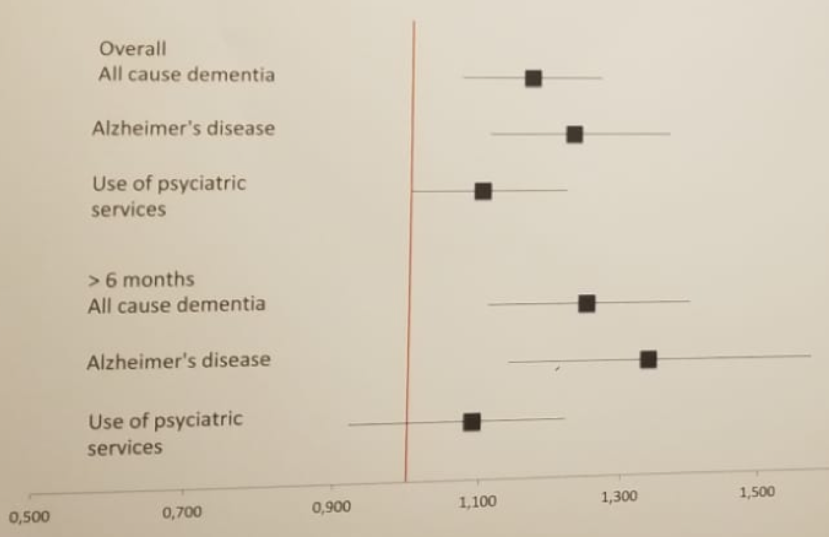Using the American SEER-Medicare database, men older than 65 who were diagnosed with localized or locally advanced prostate cancer between 1992 and 2009. Were assessed. All men who received ADT were compared to those who did not. The primary outcomes include new onset of all-cause dementia, new onset of Alzheimer’s dementia, and the use of psychiatric services. Propensity score adjusted Cox proportional hazards regression analysis were employed. Lastly, subgroup analysis comparing men who received ADT for <=6 months or >6 months was performed.
The results demonstrated that 37,911 patients received ADT during the study period. ADT was associated with an increased risk of developing all-cause dementia (HR 1.17, 95% CI 1.07-1.27) and Alzheimer’s disease (HR 1.23, 95% CI 1.11-1.37), as can be seen in figure 1. Subgroup analysis revealed that a dose-response with patients receiving ADT for >6 months being at a higher risk for all-cause dementia (HR 1.25, 95% CI 1.11-1.4) and Alzheimer’s disease (HR 1.34, 95% CI 1.14-1.58). Patients undergoing ADT for less than 6 months did not have an increased risk. Lastly, there were no differences in the use of psychiatric services.
Figure 1: Overall results showing the various hazard ratios:

The authors concluded that patients treated with ADT are at higher risk of developing “all-cause dementia” and Alzheimer’s disease. Undergoing ADT for >6 months significantly increases the risk. The limitations of this work include a selection bias due to examining a cohort of older men, who already have a higher risk of developing the outcome, but these results are still interesting, suggesting a link between ADT and dementia.
Presented by: Karl Tully, MD, Harvard Medical School, Boston, Massachusetts, United States
Written by: Hanan Goldberg, MD, Urologic Oncology Fellow (SUO), University of Toronto, Princess Margaret Cancer Centre @GoldbergHanan at the 34th European Association of Urology (EAU 2019) #EAU19, conference in Barcelona, Spain from March 15-19, 2019.


